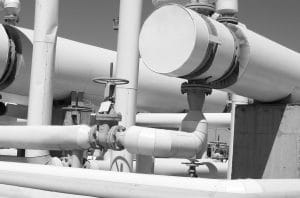 There are several different ways for addressing electrical waste heat and preventing systems from overheating. Heat exchangers became a staple for most applications because of the way in which they approach this process. In many cases, that includes phase-change processes that provide highly effective passive cooling for a wide variety of applications in most industries. Unlike more conventional HVAC-based solutions, phase-change-powered heat exchangers use the natural phase-change properties of an eco-friendly cooling fluid to collect, transfer, and dissipate heat safely and continuously. This not only simplifies the electrical thermal management process, but also creates several other benefits for most types of companies. (more…)
There are several different ways for addressing electrical waste heat and preventing systems from overheating. Heat exchangers became a staple for most applications because of the way in which they approach this process. In many cases, that includes phase-change processes that provide highly effective passive cooling for a wide variety of applications in most industries. Unlike more conventional HVAC-based solutions, phase-change-powered heat exchangers use the natural phase-change properties of an eco-friendly cooling fluid to collect, transfer, and dissipate heat safely and continuously. This not only simplifies the electrical thermal management process, but also creates several other benefits for most types of companies. (more…)
Ruggedizing Thermal Solutions for Tough Applications
 One of the greatest benefits of utilizing custom thermal management solutions for most applications is that each solution is designed specifically to meet any given application’s parameters. Generally, that means cooling electrical enclosures, control panels, and more within manufacturing and other common technological applications. As such applications have grown more advanced and powerful, the thermal management solutions needed to keep them operational have often been customized to meet their more demanding needs. For some applications, however, creating the right thermal solution involves more than just customizing the solution’s parameters. For example, in areas such as aerospace and military applications, ruggedizing thermal solutions so that they can operate under intense conditions is one of the most important forms of customization. (more…)
One of the greatest benefits of utilizing custom thermal management solutions for most applications is that each solution is designed specifically to meet any given application’s parameters. Generally, that means cooling electrical enclosures, control panels, and more within manufacturing and other common technological applications. As such applications have grown more advanced and powerful, the thermal management solutions needed to keep them operational have often been customized to meet their more demanding needs. For some applications, however, creating the right thermal solution involves more than just customizing the solution’s parameters. For example, in areas such as aerospace and military applications, ruggedizing thermal solutions so that they can operate under intense conditions is one of the most important forms of customization. (more…)
Things that Improve when Companies Use Custom Heat Exchangers
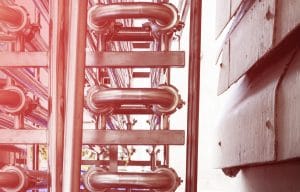 The introduction of heat exchangers, especially for keeping manufacturing and other vital equipment from overheating, has been a boon to companies in many different industries. By simply eliminating their reliance on more cumbersome and costly thermal management solutions, heat exchangers helped give companies the freedom to innovate several other areas of their operations. Since they were first introduced decades ago, heat exchangers have continued to change how companies view and approach electrical thermal management, as well as how they benefit from innovative, eco-friendly heat transfer methods. (more…)
The introduction of heat exchangers, especially for keeping manufacturing and other vital equipment from overheating, has been a boon to companies in many different industries. By simply eliminating their reliance on more cumbersome and costly thermal management solutions, heat exchangers helped give companies the freedom to innovate several other areas of their operations. Since they were first introduced decades ago, heat exchangers have continued to change how companies view and approach electrical thermal management, as well as how they benefit from innovative, eco-friendly heat transfer methods. (more…)
Why Heat Exchangers Make Eco-Friendliness Easier
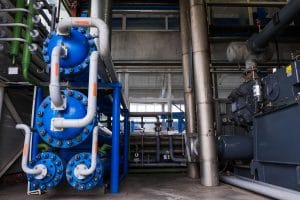 For companies in most industries, the goal to achieve optimal eco-friendliness is as important as the goal to maximize efficiency and productivity. However, some processes that have traditionally impacted the environment have sometimes seemed too complex to streamline. Electrical thermal management used to be such a process, with companies routinely having to rely on solutions like air conditioning and air compression to prevent electrical overheating. Today, however, companies now have several different conventional and custom-designed heat exchanger units to choose from. Each of which significantly improves the thermal management process, making it easier for companies to stick to their goals of eco-friendliness. (more…)
For companies in most industries, the goal to achieve optimal eco-friendliness is as important as the goal to maximize efficiency and productivity. However, some processes that have traditionally impacted the environment have sometimes seemed too complex to streamline. Electrical thermal management used to be such a process, with companies routinely having to rely on solutions like air conditioning and air compression to prevent electrical overheating. Today, however, companies now have several different conventional and custom-designed heat exchanger units to choose from. Each of which significantly improves the thermal management process, making it easier for companies to stick to their goals of eco-friendliness. (more…)
How to Use Heat Exchangers Beyond Enclosure Cooling
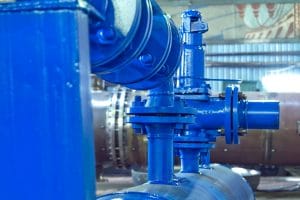 For the companies that have implemented them, modern heat exchangers have become an essential component of their operations. The custom, eco-friendly, and highly efficient thermal management solutions have proven to keep control panels and other enclosures of all sizes properly cooled without requiring nearly as much energy or maintenance as more conventional solutions. This has helped companies not only reduce overall operating costs, but also free up employee time and improve and the productivity of their equipment. However, heat exchanger technology has also been a benefit to several processes beyond enclosure cooling, including molding, food and beverage processing, wastewater treatment, and much more. (more…)
For the companies that have implemented them, modern heat exchangers have become an essential component of their operations. The custom, eco-friendly, and highly efficient thermal management solutions have proven to keep control panels and other enclosures of all sizes properly cooled without requiring nearly as much energy or maintenance as more conventional solutions. This has helped companies not only reduce overall operating costs, but also free up employee time and improve and the productivity of their equipment. However, heat exchanger technology has also been a benefit to several processes beyond enclosure cooling, including molding, food and beverage processing, wastewater treatment, and much more. (more…)
Innovating Thermal Management with Custom Heat Exchangers
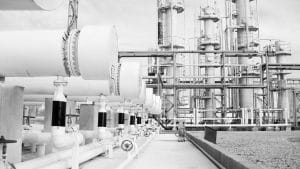 In many ways, the advancement of electrical thermal management hasn’t followed the same pattern as other technological advancements. For example, while applications like computer processing and automated equipment have grown increasingly more complex, the concepts used to innovative thermal management have become simpler. Compared to traditional HVAC and other solutions, which generate chilled air to circulate throughout the interior of an electrical enclosure, modern custom thermal solutions such as heat exchangers use simpler heat transfer methods to protect sensitive components. These methods are simpler in the fact that they transfer heat rather than overcome it, which means they can achieve higher levels of thermal management with much less effort. (more…)
In many ways, the advancement of electrical thermal management hasn’t followed the same pattern as other technological advancements. For example, while applications like computer processing and automated equipment have grown increasingly more complex, the concepts used to innovative thermal management have become simpler. Compared to traditional HVAC and other solutions, which generate chilled air to circulate throughout the interior of an electrical enclosure, modern custom thermal solutions such as heat exchangers use simpler heat transfer methods to protect sensitive components. These methods are simpler in the fact that they transfer heat rather than overcome it, which means they can achieve higher levels of thermal management with much less effort. (more…)
More Customized Liquid Cooling with Cold Plates
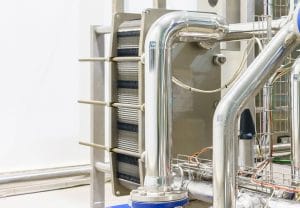 When heat exchangers first gained popularity as efficient electrical thermal management solutions, the most common types were ambient cooling units that utilized air-to-air heat transfer methods to eliminate waste heat. The process is one that costs significantly less in both money and energy when compared to previous solutions that used more conventional HVAC methods. Today, air-to-air heat exchangers are still popular, but for many applications, the advanced liquid cooling capabilities of custom cold plates are often a more ideal solution. By creating flow paths within custom cold plates and circulating eco-friendly cooling fluid (such as water) through them, such solutions bring the high-performance thermal management of liquid cooling to a much broader range of applications. (more…)
When heat exchangers first gained popularity as efficient electrical thermal management solutions, the most common types were ambient cooling units that utilized air-to-air heat transfer methods to eliminate waste heat. The process is one that costs significantly less in both money and energy when compared to previous solutions that used more conventional HVAC methods. Today, air-to-air heat exchangers are still popular, but for many applications, the advanced liquid cooling capabilities of custom cold plates are often a more ideal solution. By creating flow paths within custom cold plates and circulating eco-friendly cooling fluid (such as water) through them, such solutions bring the high-performance thermal management of liquid cooling to a much broader range of applications. (more…)
Transferring Heat for High-Performance Control Panels
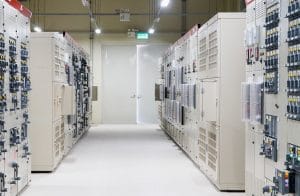 Cooling control panels (as well as various other electrical enclosures) is a vital function for most industries these days. It grows even more essential as companies continue introducing more powerful and fully integrated systems, including automated equipment and processes. Because of its importance, the efficiency with which a company’s electrical thermal management systems can remove excess heat from such enclosures largely determines that company’s level of productivity and success. For many such applications, modern custom thermal solutions, such as heat exchangers, often provide optimal results, providing high-level heat transfer capabilities to virtually any type of application in wide range of industries. (more…)
Cooling control panels (as well as various other electrical enclosures) is a vital function for most industries these days. It grows even more essential as companies continue introducing more powerful and fully integrated systems, including automated equipment and processes. Because of its importance, the efficiency with which a company’s electrical thermal management systems can remove excess heat from such enclosures largely determines that company’s level of productivity and success. For many such applications, modern custom thermal solutions, such as heat exchangers, often provide optimal results, providing high-level heat transfer capabilities to virtually any type of application in wide range of industries. (more…)
Customizing Thermal Solutions for Virtually Any Application
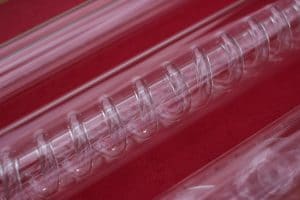 The various technologies that industries rely on these days come in all sizes and are implemented for nearly all types of applications. In many cases, technological solutions are customized to meet the unique needs of certain advanced applications, or those that are designed for highly specific processes. To meet the specific thermal management needs of such innovative applications, companies often rely on custom thermal solutions, such as heat exchangers, which often provide optimal, high-performance electrical cooling at minimal costs. Using comprehensive design and analysis capabilities, eco-friendly heat transfer concepts, and innovative manufacturing techniques, modern custom thermal solutions can be just as beneficial for applications of all types. (more…)
The various technologies that industries rely on these days come in all sizes and are implemented for nearly all types of applications. In many cases, technological solutions are customized to meet the unique needs of certain advanced applications, or those that are designed for highly specific processes. To meet the specific thermal management needs of such innovative applications, companies often rely on custom thermal solutions, such as heat exchangers, which often provide optimal, high-performance electrical cooling at minimal costs. Using comprehensive design and analysis capabilities, eco-friendly heat transfer concepts, and innovative manufacturing techniques, modern custom thermal solutions can be just as beneficial for applications of all types. (more…)
Cooling Molds Faster with Thermal Pins
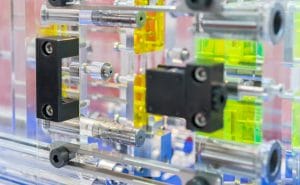 The advantages that custom thermal solutions such as heat exchanger technology have brought to most industries have are well-known. From providing more eco-friendly solutions to cooling enclosures to helping companies lower overall energy and maintenance costs, heat exchangers have given companies a significant advantage in the realm of electrical thermal management. As more companies have employed the thermal solutions for an increasingly wider variety of applications, those benefits have multiplied. In some applications, the same heat transfer concepts that heat exchangers utilize can be customized to fit highly specific applications. For example, thermal pins utilize the significant advantages of heat exchanger technology to vastly improve quality and cycle times within the injection molding process. (more…)
The advantages that custom thermal solutions such as heat exchanger technology have brought to most industries have are well-known. From providing more eco-friendly solutions to cooling enclosures to helping companies lower overall energy and maintenance costs, heat exchangers have given companies a significant advantage in the realm of electrical thermal management. As more companies have employed the thermal solutions for an increasingly wider variety of applications, those benefits have multiplied. In some applications, the same heat transfer concepts that heat exchangers utilize can be customized to fit highly specific applications. For example, thermal pins utilize the significant advantages of heat exchanger technology to vastly improve quality and cycle times within the injection molding process. (more…)







